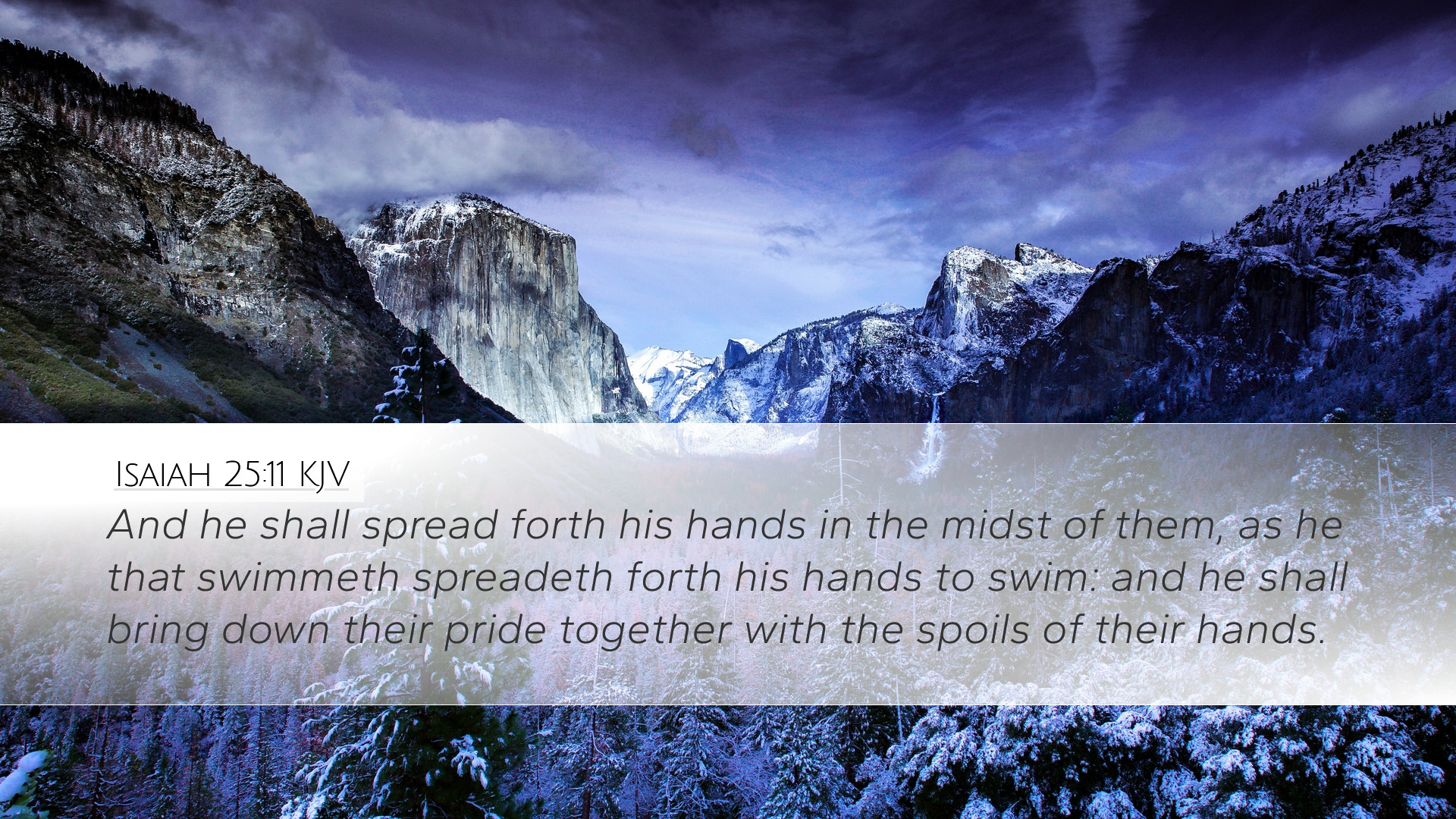Commentary on Isaiah 25:11
Introduction
Isaiah 25:11 presents a vivid image of the fate of the enemies of God's people, drawing on rich imagery and profound theological significance. This verse encapsulates themes of judgment, divine justice, and the ultimate triumph of God over His adversaries. The commentaries by Matthew Henry, Albert Barnes, and Adam Clarke provide a wealth of insights that enhance our understanding of this poignant scripture.
Text of the Verse
Isaiah 25:11: "And he shall spread forth his hands in the midst of them, as he that swimmeth spreadeth forth his hands to swim: and he shall bring down their pride together with the spoils of their hands."
Exegesis and Analysis
This verse fits into the broader context of Isaiah 25, which speaks of the Lord’s victory over death, oppression, and the nations. The imagery used in this verse conveys a profound message of divine intervention and the humiliation of the proud.
1. The Divine Gesture of Judgment
Matthew Henry comments on the gesture of spreading forth hands. He interprets this as God’s active demonstration of power and authority over His foes. Just as a swimmer uses their arms to navigate through water, so does God exercise control over the chaos and pride of the nations. The act symbolizes God's ability to cast down the proud, signifying His exaltation as the ultimate authority.
2. The Symbol of Humiliation
Albert Barnes describes the use of hands in this verse as indicative of humiliation. The powerful, once standing tall and proud, are now being brought low by the omnipotent God. This act is not merely punitive; it is a representation of God's justice. The proud enemies, once full of confidence, will be disarmed and stripped of their dignity, much like a swimmer struggling against the overwhelming force of water.
3. Into the Depths of Defeat
Adam Clarke expands on the imagery by discussing how this gesture indicates total defeat. The swimmers’ struggle against the water symbolizes the ultimate futility of those opposing God. In the context of religious leadership and those who oppose divine authority, Clarke emphasizes that no matter how much they struggle against God's will, they will ultimately fail. This theological insight serves to remind believers of the transient nature of human pride and the eternal reality of divine truth.
Thematic Considerations
Several theological themes can be drawn from Isaiah 25:11. These include:
- Divine Sovereignty: God’s supremacy over all forces and nations is a comforting notion for believers. It provides reassurance that despite appearances, He is always in control.
- Judgment: The verse illustrates the reality of judgment that aligns with the broader biblical narrative that God will right the wrongs of the world, bringing pride and opposition against Him to a lowly state.
- The Assurance of Victory: For the faithful, these words serve as a powerful promise that God will deliver justice. It shifts the focus from despair in opposition to hope in divine intervention.
Pastoral Applications
This verse holds significant value for pastoral teaching and personal application:
- Encouragement in Trials: Pastors can use this commentary to provide hope to congregants facing adversity. It serves as a reminder that while the proud may seem to prosper, God has the final say.
- Teaching on Humility: The themes of pride and humility can be explored in sermons, encouraging believers to remain humble and reliant on God’s grace.
- Prayer for Justice: This verse can inspire prayers for justice in the world, as it invokes the imagery of God intervening in human affairs for the purpose of upholding righteousness.
Conclusion
Isaiah 25:11 serves as a powerful testament to God's ultimate authority and the futility of pride against His will. Through the insights of Matthew Henry, Albert Barnes, and Adam Clarke, we gain a deeper understanding of the rich layers of meaning contained within this verse. It speaks not only to the historical context in which Isaiah was writing but also resonates with timeless truths applicable to our modern circumstances. As we explore these themes, let us hold fast to the assurance of God's justice and the promise of His victory over all adversaries.


